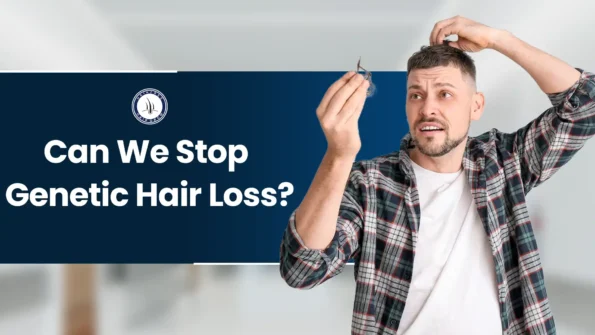Hair loss is a common concern for many, but when it comes to genetic hair loss, the question often arises: Can we stop genetic hair loss? This type of hair loss, also known as androgenetic alopecia, is influenced by your DNA and can affect both men and women. While completely stopping genetic hair loss may not always be possible, there are various ways to slow it down, manage it, and, in some cases, regrow lost hair. Let’s explore this topic in depth.
What Is Genetic Hair Loss?
Genetic hair loss, also known as androgenetic alopecia, is the most common type of hair loss seen in both men and women. In men, it is often referred to as male pattern baldness, while in women, it is called female pattern hair loss. This condition typically starts with thinning hair, shorter hair strands, and eventually hair falling out completely.
The genetic hair loss pattern differs between genders.
- In men: Hair starts receding from the front or crown, leading to a distinctive “M” shape.
- In women: Hair density reduces from the top of the scalp, but the hairline remains intact.
How Does Genetic Hair Loss Happen?
The primary culprit behind genetic hair loss male and genetic hair loss in women is the interaction between hormones and genetic predisposition. Here’s how it works:
1. Role of Testosterone and DHT
Testosterone, a male hormone, is converted into Dihydrotestosterone (DHT) by an enzyme called 5-alpha reductase.
- DHT binds to hair follicles, causing them to shrink over time.
- This shrinking makes hair grow thinner and eventually stops new hair growth.
2. The Genetic Factor
Not all hair follicles are affected by DHT. Only those with a genetic sensitivity to DHT experience hair loss.
- If you inherit certain genes, your hair follicles are more likely to react to DHT.
3. Age Factor
The onset of hair loss depends on the genetic hair loss age. Some may notice it as early as their 20s, while others might experience it later in life.
Can Genetic Hair Loss Be Stopped?
The direct answer is no—you cannot completely stop genetic hair loss. However, you can slow down the progression and even restore some of the lost hair with proper care and medical interventions. Below are some proven methods:
1. Medications
The two most popular medications for genetic hair loss are:
- Minoxidil: This over-the-counter treatment promotes hair growth and slows hair loss.
- Finasteride: A prescription drug that reduces DHT levels, helping hair follicles survive longer.
Both medications are effective for genetic hair loss male and genetic hair loss in women, although women should use these treatments under medical supervision.
2. Balanced Diet
Eating a nutrient-rich diet is vital for healthy hair. Foods high in biotin, zinc, iron, and vitamins like A, D, and E can strengthen hair follicles. Leafy greens, nuts, eggs, and fatty fish are great additions to your diet.
3. Scalp Care
Maintaining a clean and healthy scalp encourages hair growth. Regular scalp massages can improve blood circulation, helping nutrients reach your hair follicles.
4. Stress Management
Chronic stress can worsen hair loss. Practices like yoga, meditation, or even a daily walk can reduce stress levels and promote hair health.
5. Avoid Harsh Hair Treatments
Heat styling, chemical treatments, and harsh shampoos can weaken hair, making it more prone to falling out. Opt for gentle, sulfate-free shampoos and limit the use of heat tools.
6. Surgical Options
1. Platelet-Rich Plasma (PRP) Therapy
PRP therapy involves injecting platelet-rich plasma from your blood into the scalp. It promotes hair regrowth by stimulating the hair follicles.
2. Hair Transplantation
Hair transplantation is a permanent solution for those with significant hair loss. It involves moving healthy hair follicles to bald areas, restoring a natural look.
3. Laser Therapy
Low-level laser therapy (LLLT) is a non-invasive option that improves blood flow to hair follicles, encouraging growth.
Does It Work for Everyone?
While treatments can be effective, the results depend on:
- The stage of hair loss when treatment begins.
- Consistency in following the treatment plan.
- Individual responses to medications.
It’s important to consult a specialist to determine the most suitable treatment for your condition.
Myths About Genetic Hair Loss
- It Only Affects Men
False! Genetic hair loss in women is also quite common. While men experience receding hairlines, women typically notice thinning hair on the crown. - It Happens Overnight
Hair loss due to genetics is gradual and follows a specific genetic hair loss pattern. Early signs include thinning and reduced hair density. - It’s Irreversible
Although we can’t eliminate the genetic predisposition, effective treatments can control and even reverse hair loss to some extent.
Choosing the Right Treatment for You
If you’re dealing with genetic hair loss, there’s no one-size-fits-all solution. Factors like the stage of hair loss, overall health, and personal preferences play a big role in determining the best course of action. Consulting a professional clinic can help you understand your options better.
Take Action with Hairfree & Hairgrow Clinic
Dealing with genetic hair loss can be challenging, but you don’t have to face it alone. At Hairfree & Hairgrow Clinic, we specialize in personalized treatments to help you regain confidence. From PRP therapy to advanced hair transplantation, we offer state-of-the-art solutions tailored to your unique needs.
Don’t wait—schedule your consultation today and take the first step towards healthier, fuller hair!
FAQs About Genetic Hair Loss
1. At What Age Does Genetic Hair Loss Start?
Genetic hair loss age varies, but it often begins in the late teens to early 20s for men and mid-30s to 40s for women. Early signs include thinning or a receding hairline.
2. Is Genetic Hair Loss Common in Women?
Yes, genetic hair loss in women is more common than people think. It typically results in overall thinning rather than bald spots and affects nearly 40% of women by age 50.
3. Can Men and Women Use the Same Treatments?
Some treatments, like minoxidil, are effective for both genetic hair loss male and genetic hair loss in women, but dosages and application methods may differ. Always consult a specialist before starting any treatment.
4. Does Hair Transplantation Work for Genetic Hair Loss?
Yes, hair transplantation is an effective solution for genetic hair loss pattern, especially for those with stable hair loss who want long-lasting results.
Written By
MD (Skin & VD)
Dr. Kiran Chotaliya is a hair restoration expert specializing in Can we stop Genetic Hair Loss. He provides scientific insights on slowing hair loss, effective treatments, and preventive care, helping patients manage hereditary hair thinning for healthier, long-lasting hair growth.
Disclaimer
We’ve made all possible efforts to ensure that the information provided here is accurate, up-to-date and complete, however, it should not be treated as a substitute for professional medical advice, diagnosis or treatment. See Detailed Disclaimers Here.


